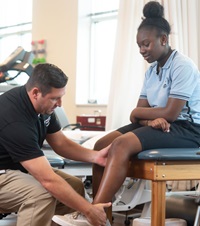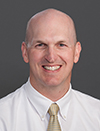Atrium Health Wake Forest Baptist is proud to serve as The Official Health Care Provider, Team Doctors and Athletic Trainers for Winston-Salem Forsyth County Schools. We partner together to provide our student-athletes and community with the care they need to stay at their best and injury-free.
 The school year is well underway, and with it, is the excitement of fall sports. As student-athletes hit the field, many parents may wonder: Who keeps our kids safe and injury-free?
The school year is well underway, and with it, is the excitement of fall sports. As student-athletes hit the field, many parents may wonder: Who keeps our kids safe and injury-free?
On the sidelines for practices and games, and behind the scenes, a team of healthcare professionals works tirelessly to ensure that young athletes can perform at their best while staying healthy throughout the season.
This team is part of Atrium Health Wake Forest Baptist, the official health provider for Winston-Salem Forsyth County Schools, and over 100 high schools throughout the Carolinas.

We spoke with two of those dedicated health professionals, Dr. Heath Thornton, medical director for the Atrium Health Wake Forest Baptist Athletic Trainer outreach program and team physician for Ronald W. Reagan High School, and Emily Dyer, head athletic trainer for Reagan High. They shared their insights on how Atrium Health Wake Forest Baptist’s commitment to student-athletes is helping to shape a safer and healthier school year, at all of our partner high schools.
What do team doctors and athletic trainers do?
 Dr. Thornton: As the team doctor, my primary role is to ensure the health and safety of our student-athletes. This involves preventing injuries through collaboration with coaches, diagnosing and treating any injuries that do occur, and making sure each athlete is medically cleared to participate in sports. My job is to coordinate with other healthcare providers when necessary to provide a fast-track to comprehensive care for our athletes.
Dr. Thornton: As the team doctor, my primary role is to ensure the health and safety of our student-athletes. This involves preventing injuries through collaboration with coaches, diagnosing and treating any injuries that do occur, and making sure each athlete is medically cleared to participate in sports. My job is to coordinate with other healthcare providers when necessary to provide a fast-track to comprehensive care for our athletes.
 Emily: As the athletic trainer, I'm hands-on with the athletes daily. I focus on injury prevention, and I'm the first responder when injuries happen during practices or games. I assess injuries, provide immediate care, and guide athletes through their rehabilitation process. I also communicate regularly with coaches, parents, athletes and our team doctor to ensure everyone is informed about any health concerns. My goal is to help athletes recover quickly and safely while keeping a close eye on their progress.
Emily: As the athletic trainer, I'm hands-on with the athletes daily. I focus on injury prevention, and I'm the first responder when injuries happen during practices or games. I assess injuries, provide immediate care, and guide athletes through their rehabilitation process. I also communicate regularly with coaches, parents, athletes and our team doctor to ensure everyone is informed about any health concerns. My goal is to help athletes recover quickly and safely while keeping a close eye on their progress.
Why is this program so critical to the health and safety of student-athletes?
Dr. Thornton: I grew up in North Carolina playing school sports. During my high school years, one of my close teammates died on the practice field. I remember the impact that had on his family, our team, coaches, school and community. I also remember the discussion around what happened and how to prevent it from happening again. Having a well-trained athletic trainer on-site with proper protocols in place has been shown to make the biggest impact on preventing the risks of athletic activities from becoming a tragedy.
Emily: Having athletic trainers in the high school setting is crucial to the health and safety of all student-athletes who choose to participate in sports. Participating in athletics always has an inherent risk for injury, and having an individual who is educated in the proper care of those injuries is important for continued participation and a safe return.
Athletic trainers are trained healthcare providers who provide emergency care; assessment, evaluation and diagnosis of injury; and risk reduction and wellness/health literacy. We do a lot more than what people see. Continued education on how we operate, and the scope of our practice is how we continue to grow the field and keep our athletes and communities healthy.
What makes the sports medicine program at Atrium Heath Wake Forest Baptist different than every other program?
Dr. Thornton: Because of our academic medical center and its residencies and fellowships, we have been able to place 11 Sports Medicine fellowship-trained physicians as supervision physicians at each of WSFCS high schools. Our team has experience in caring for professional and collegiate teams from across the country and can bring that expertise to our high school athletes. They provide supervision for over 30 fellows and residents who support and are readily available to our certified athletic trainers at each school. This is what creates our dedicated medical team. This design not only provides onsite game coverage but also rapid access to evaluation and treatment.
Emily: Atrium Health Wake Forest Baptist is one of the largest athletic trainer outreach programs in the United States. As a larger hospital-based academic system we can provide a lot of resources, technology and specialists that are then made available to our student-athletes all within the same network. It makes referral to the appropriate provider even easier and communication across all those within the healthcare team possible.
What is the difference between your roles?
Dr. Thornton: Emily, and all of our athletic trainers, are onsite, providing point-of-care services that help keep the athletes safe from further injury. Because she is committed to the school, teams and athletes, she becomes familiar with each athlete. She understands the stress and strains of practice and is viewed as part of the team as a whole. She becomes the warning voice when risks begin to increase for an individual athlete or the team as a whole. And she provides critical insight for the physicians who also need to evaluate athletes, and influence policy to protect the athletes.
In addition to providing coverage as head team physician for two WSFCS high schools, as the program medical director, I provide educational presentations, medical advice for policy and procedures, recommendations for medical sideline response, and organized physician coverage.
Emily: My role as the athletic trainer is to provide care to all student-athletes who walk into my athletic training room, located inside of the school, or I am called to help. The word "care" is very broad when working in the high school setting. It's not just rolled ankles and concussions that we care for, kids get sick, have bad days, or need a little advice. You really have to be prepared for anything that comes your way!
On the flip side, Dr. Thornton and our team physicians are there as a resource to see athletes who may need more care beyond what I can provide here at the school.
Why is it important to have both?
Dr. Thornton: We work as a team, as progression of care is necessary for the athletes. When treatment or evaluation is unable to be done on the field or training room, Emily brings one of the physician team members in to provide that next level of care.
Emily: It's important to have both because it takes a team to provide adequate care to all student-athletes. With Dr. Thornton and his amazing support, we can get student-athletes seen quickly. Dr. Thornton has always been a really big supporter of athletic trainers and has advocated for the work we do in our schools, and it does not go unnoticed by us! On the other hand, without having an athletic trainer in the schools things might go unnoticed until it becomes an even larger issue.
What do you do to help with the prevention of injuries?
Dr. Thornton: Atrium Health Wake Forest Baptist works frequently with WSFCS athletics leadership to promote policies and procedures that have been shown to contribute to injury prevention. At an individual school level, the athletic trainers and physicians work with administration and coaches to follow through on these policies and procedures.
We are constantly on the lookout for signs in individual athletes that could indicate an increased risk of injury. Once identified, treatment or accommodations are put into place to reduce that risk.
Emily: There are rules and regulations set by the county and by the state that are designed to help mitigate some of the risks associated with sports participation. Examples of these are related to heat guidelines, return to play after concussions, wrestling skin infections, weather policies, and quite a bit more. I help to ensure we are following those guidelines, and the safety of each student-athlete is the top priority.
What about the treatment of injuries?
Dr. Thornton: While Emily can provide a wide range of treatments for injuries, we also have access to the immense resources of an academic medical center with cutting-edge diagnostic and therapeutic interventions. If a student athlete’s injury needs to be elevated, our athletic trainers can quickly get that athlete an appointment with one of our orthopedic and sports medicine specialists at a convenient nearby location.
Emily: While some injuries need to be seen in the doctor’s office, there are a lot of injuries athletic trainers can take care of in the school without the student-athlete needing to see a doctor in the office. Those that I can take care of in the school may include wound care, taping and bracing of a specific injury, rehabilitation exercises, and sports participation modifications.
Should student-athletes ever ignore and "power through" an injury? And when should they seek your care, specifically?
Dr. Thornton: No symptoms should ever be "ignored". Emily and the other athletic trainers are there to provide that rapid assessment to help the athlete and parent determine if further evaluation is needed. As a primary care sports medicine physician, I can evaluate sports-related issues from head to toe, ranging from broken bones to sudden decreased performance. We have same-day or next-day access for all our WSFCS athletes.
Emily: Student athletes should seek my care when their participation is being impacted, even if it’s a small discomfort or pain. I am the first line of defense when it comes to student-athletes being seen either on the field, sideline, or at the school. I act as a filter and help determine what injuries or conditions need my attention, or more care by a provider. The student-athletes should never be ignoring symptoms as this can lead to an injury getting worse.
Learn more about Atrium Health Wake Forest Baptist’s Athletic Trainer Program and find your school's Athletic Trainer.
To schedule an appointment with an Orthopaedic or Sports Medicine specialist, call 888-716-WAKE (9253) or schedule online.
